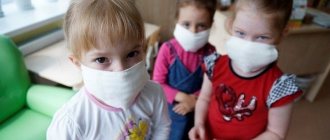The importance of a walk in a child's life
If a specialist in the field of pediatric medicine asks whether to walk with a child with a runny nose and rhinitis, his answer will be unequivocally affirmative: yes!
During illness, it is especially important to breathe fresh air. After all, indoors, viruses remain in the air, and a recovering child can “catch” them again. Walking in places where coniferous trees grow is especially useful. The air here is simply saturated with phytoncides, which have a number of healing properties. It is in the fresh air that the body hardens, the immune system is strengthened, and the ability to withstand cold and dampness develops. Blood flow increases, breathing quickens, and as a result, an intensive fight against harmful microorganisms occurs in the nasal cavity. The respiratory tract is naturally moistened, expectoration improves, and the healing process is accelerated.
While the child is away from the house, it is necessary to ventilate the room. As a result, the number of viruses and microbes in the air is significantly reduced and ceases to pose a danger to the child’s body.
If you have a runny nose, do not be alarmed, as with proper treatment it goes away very quickly. It cannot be compared to the flu or inflammatory diseases, so you can continue to lead the same lifestyle.
Is it possible to walk with a runny nose or not?
Are you still sick, but you don’t want to sit at home and suffer? But you really want to take a walk and breathe some fresh air... What to do, will you really have to not leave the house for a few more days?
Of course, you can take walks, they will only be beneficial. But this should only be done if you feel normal - there is no fever, convulsions or high temperature. If you can’t even get out of bed, a walk should be postponed until better times.
In addition, you need to take into account the cause of the runny nose . If it is a cold, walking is useful and necessary, but if you are allergic to pollen, limit your visits to the street, this can lead to complications. It could also be an allergy to house dust or the hair of your pets; try to spend as much time as possible in the fresh air.
Helpful advice: reduce the duration of the walk, so you can avoid complications. If you feel like you're tired and you've had enough, go home and perk up with hot tea with lemon and honey.
also plays an important role . It is not advisable to walk for too long if there is strong wind or frost outside. High humidity can also negatively affect the healing process.

If you feel unwell and decide not to go for a walk, we recommend opening the windows for at least a few minutes and letting fresh air into the room. It would also be a good idea to humidify the air in the room; a humidifier will help you with this. To avoid spending money on a humidifier, place several bowls of water in the room.
Is it possible to walk with a child if you have a cough or runny nose?
Again, it all depends on the symptoms and condition of the patient. If your child feels fine and does not have a fever or persistent cough, be sure to take him for a walk.
Thanks to fresh air, the respiratory tract is cleared, it becomes much easier for the child to breathe, and less mucus is formed. 20-30 minutes a day is enough; if you feel well, you can walk both in the morning and in the evening.
What to do if your baby wants to play with others and run around? This is prohibited, let him wait another week.
Rules for walking when you have a runny nose:
- Dress warmly. But this does not mean that you should go and sweat, as you will only worsen your condition. Wrap a scarf around your throat and put on a hat if it's cold outside.
- If you are walking with your child, make sure that he does not run, as he will inhale cold air.
- Is it raining and slushy outside? Put off your walk, you will get wet and your runny nose will get worse.
- Do not forget to regularly clear mucus from your nose and bury it. Don't forget to bring napkins or a handkerchief with you so you can blow your nose while walking.
As you can see, there is no cardinal prohibition, and if you have a runny nose, you don’t have to sit inside four walls and be sad. A short walk in normal weather conditions will only do you good!
Women's online magazine Delafe.ru - all about health
How to walk properly
The benefits of walking are considerable, but there are a number of restrictions that must be observed:
- The baby should not resemble a bun, which can only be rolled on a walk, since he will not be able to move on his own. His parents put too many clothes on him. When walking, he should move a lot, this will keep him from freezing, not kilograms of clothes. The same rule must be followed when taking a baby outside in winter.
- You should not go for a walk in strong winds and rain. The child, firstly, simply won’t like it, and secondly, it will bring harm, not benefit.
- When walking, your nose should not be clogged, so you need to clean it before going outside. Breathing through the mouth should not be allowed.
- The walking time in warm weather should be at least an hour, and in cool weather - at least 20 minutes.
When is the best time to cancel a walk?
“Should I walk with my child if he has a runny nose and cough, if he has a fever?” some mothers ask. Despite the benefits of walking, there are situations when it is better to refuse it. Just the presence of a slight runny nose without other symptoms of illness cannot be a reason for a ban.
A complete refusal to walk should occur if:
- The child is lethargic and unwilling to move a lot, which is not typical for him;
- Body temperature above 37.5 degrees;
- The weather outside leaves much to be desired;
- There is a period of active flowering or shedding of poplar fluff, and the child is allergic. A cold runny nose will gradually turn into an allergic one. Of course, you can walk with your child with a runny nose, but with a cotton-gauze bandage covering the nose and mouth and only for 20 minutes.
During this difficult period, you should not allow your child to contact other children. He can infect them or pick up a new infection. It is better to go to a park where there are many trees and clean air.
Is walking allowed?
A simple runny nose disappears after a couple of days if treatment is organized correctly. In children, rhinitis is not a serious disorder, but it causes many inconveniences: loss of appetite, sleep disturbance, and deterioration in general mood. In order to protect the baby from factors complicating the disease, parents stop daily walks. Is this justified?
Experienced pediatricians say that walking with a runny nose is possible, but certain factors should be taken into account:
- what is the child's illness?
- general condition of the baby;
- weather conditions;
- means and methods of treatment;
- organizing a walk.
The most important point to consider is the well-being of the child as a whole. It is forbidden to take an exhausted child for a walk during the acute stage of the disease.
Recommendations from Komarovsky
During the acute phase of a cold, especially the first days, when the body is subjected to heavy stress, it is necessary to maintain bed rest, and walking during this period is strictly forbidden, so as not to cause complications. This applies to children of all ages.
A severe cough that makes breathing difficult is also a reason to stay home. The doctor warns that walking with such a symptom and with a weakened immune system will lead to complex diseases that can become chronic: sinusitis, pneumonia, tonsillitis, otitis media.
Dr. Komarovsky also does not recommend going for a walk because you can become infected with a bacterial infection, since during a cold the body is weakened and weakly protected from the invasion of viruses.
Source: dailykids.ru
Is it worth walking with a child with a runny nose?
The famous pediatrician Dr. Komarovsky gives a number of tips and answers to the question, is it possible to walk with a child with a runny nose? His conviction is that there should be no health restrictions. And in order for recovery to occur faster, it is necessary to maintain a certain temperature and humidity at home. The last factor directly affects the condition of the nasal mucosa. It should not dry out, as it is a kind of protection against the penetration of bacteria and viruses into the respiratory tract. Komarovsky makes an exception only for the period of acute illness with high fever and obvious symptoms of intoxication of the body.
Is it possible to walk with a child with a runny nose or cough in winter in severe frost? The same doctor Komarovsky, although he encourages walking in any weather, still advises treating this issue without fanaticism. Why take a child out into the street if the parent himself “doesn’t get along well”? He will have to be wrapped in a hundred clothes, and the point of such an outing into the fresh air is reduced to zero. Nothing bad will happen if the child stays at home for a week.
Komarovsky also calls for careful attention to breathing through the nose. Only in the nasal cavity does the cold air warm up, and the required temperature enters the respiratory tract. In addition, pathogens are filtered out in the nose.
Now the answer to the question of whether to take your child for a walk if he has a runny nose or cough is obvious and unambiguous: definitely go for a walk!
We also recommend reading: Can a child be given citramon? Read all the most useful things on our website: Is it possible for a child?
Is it possible for a child with a runny nose and cough to go for a walk? Komarovsky
Active games in nature or just walking in the fresh air are always useful for everyone. But when a child has a cough and runny nose, many parents are afraid to take him out for a walk. In the traditional view of adults, fresh cold air, wind or snow can harm the baby and give him an even worse cold. In this article we will find out: is it possible to walk with a child with a runny nose and cough, what is the benefit of fresh air, and in what cases should you not take a sick child for a walk.
How is fresh air beneficial?
Many pediatricians believe that walks and active games in the fresh air can have a beneficial effect on the physical condition of the baby, ventilate the lungs from pathogenic microbes and significantly improve the general condition of the body. For such walks, it is better to choose parks and park squares, forest areas, places with numerous plantings, where there are bushes, trees, flowers and flower beds, corners of nature, decorated in landscape design. Any plant, in the process of its life activity, enriches the air with useful substances and enzymes, releasing useful ions and pure oxygen into space, and rainy or windy, but warm weather spreads fresh and clean air around. The influence of fresh air on a child’s body is undeniable:
— fresh air has a beneficial and active effect on blood circulation in any body, including children’s. During breathing, fresh air enters the lungs, enriching the entire body with oxygen, as a result of which blood circulation is significantly improved, and all microbes and viruses rooted in the body come out.
— fresh air helps to moisturize the mucous membranes of the nasopharynx, breathing becomes freer and cleaner;
- fresh air allows the child to thoroughly blow his nose and cough; cool, but not cold air, ventilates the child’s lungs and nasopharynx, helps enrich the body with pure oxygen, which has a positive effect on the course of all metabolic processes in the body;
- active physical movements in the fresh air contribute to the overall health of the body and fill every cell with good nutrition;
Is it possible to walk with a child with a runny nose?
If a child has a cold and a runny nose, he must breathe fresh air. But it is necessary to follow some rules so as not to harm the baby:
- with a slight runny nose, when the child shows physical activity and is interested in a walk;
- the child should be dressed lightly, but in warm clothes. When the baby is physically active during a walk, there is a risk that the child, wrapped up too warmly, will sweat and, with sharp gusts of wind, catch an even stronger cold;
- It is better not to take a sick baby out for a walk in severe frost, gusty wind or slushy rain. But if the wind and rain are calm and warm, such a walk can fill the baby’s sick body with fresh oxygen and help cope with the disease;








